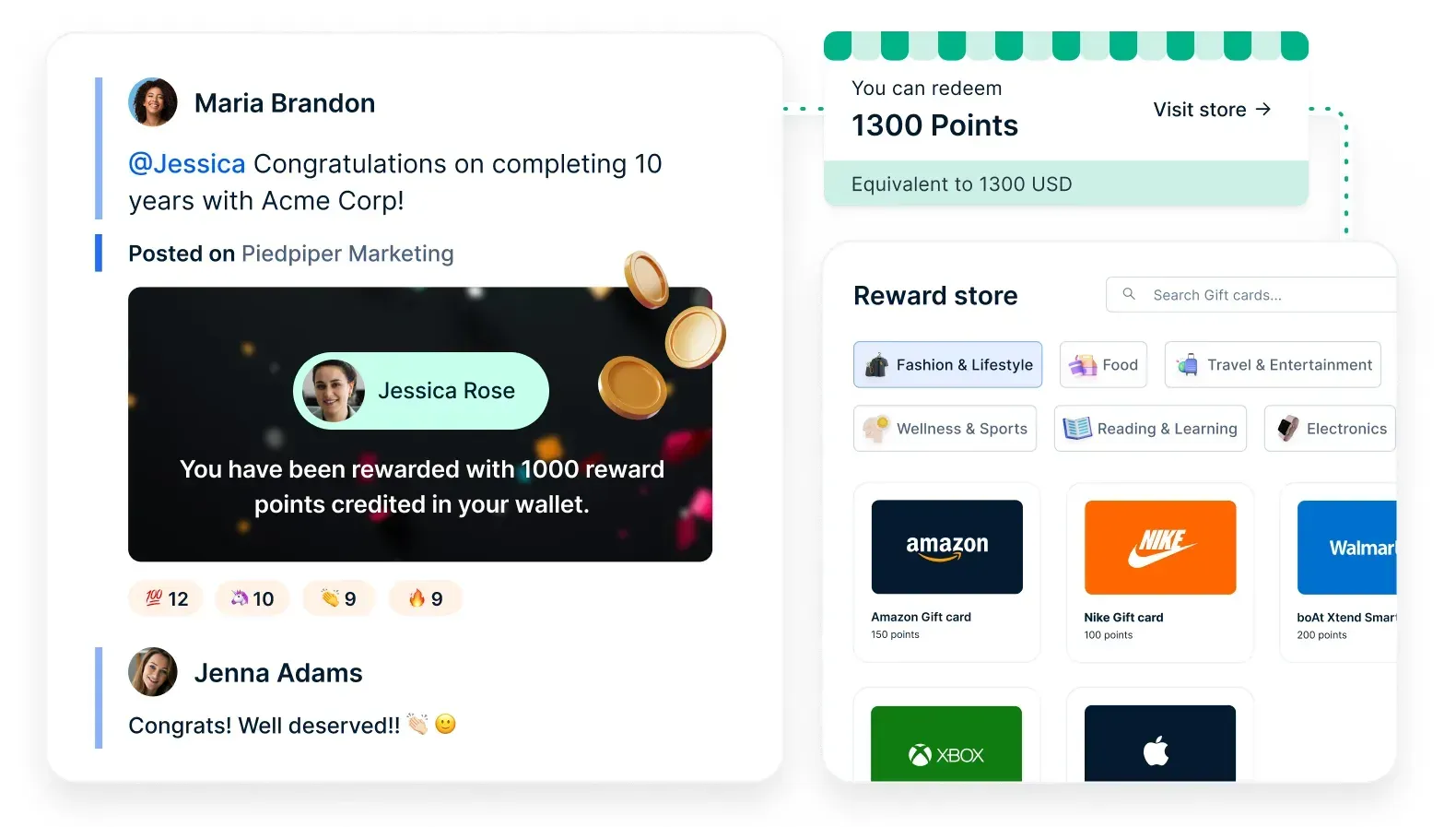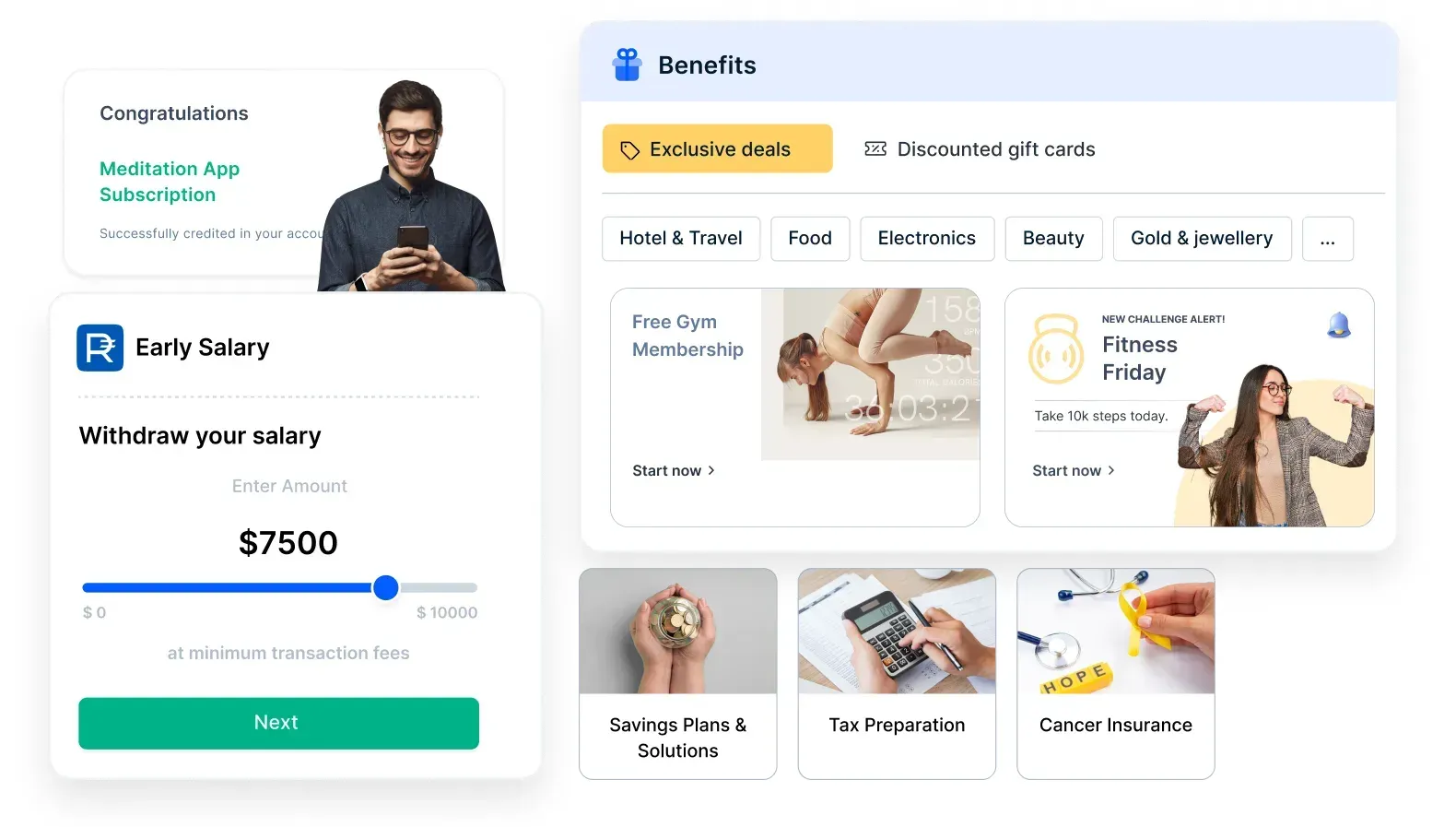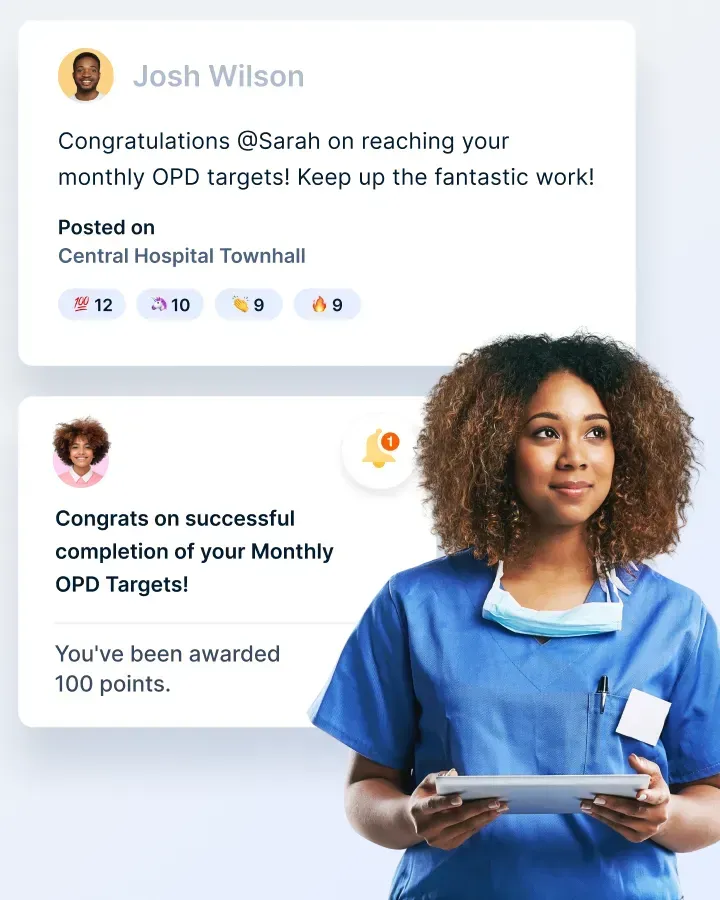12 Proven Ways to Improve Healthcare Employee Engagement and Reduce Burnout
Healthcare employee engagement is vital for better care, lower turnover, and improved morale. Explore 12 actionable strategies to improve employee engagement in healthcare and build a resilient, motivated workforce that thrives under pressure.
On this page
Are your healthcare employees truly happy, motivated, and engaged in their roles?
Recent studies show a troubling trend—employee engagement in healthcare has seen a notable decline, with a 7-point drop between 2019 and 2022. As overall U.S. engagement levels dip to just 32%, it's clear that healthcare employee engagement is under pressure like never before.
This decline doesn’t just affect staff morale—it impacts patient care, retention, and organizational outcomes. The good news? With the right strategy and tools in place, it's entirely possible to improve employee engagement in healthcare and reignite purpose, productivity, and well-being within your teams.
Let’s explore practical, proven ways to boost engagement and create a more connected, resilient healthcare workforce—for the benefit of both your staff and the patients they serve.
What does engagement mean in healthcare?
You must understand the difference between employee happiness and employee engagement.
Employee engagement describes how connected employees feel to their workplace. While happy employees might be content with their work, engaged employees are deeply committed to their organization's mission and values.
Unlike employee happiness, employee engagement directly influences team performance. In healthcare, engaged employees can make a significant difference, like:
- Higher patient satisfaction
- Increased patient safety
- Improved quality of care
A Gallup survey of 200 hospitals indicated that hospitals with more engaged nurses experienced lower patient mortality rates.
Financially, investing in employee engagement also has its merits. Hospitals with less engaged nurses tend to pay over $1.1 million more per year in malpractice claims than those with more engaged nurses.
Here are 10 ways to assist you in better supporting your medical staff, enhancing employee engagement, and improving patient satisfaction and care.
Challenges in the healthcare industry and how Empuls solves them
The healthcare and pharmaceutical industries are built on precision, dedication, and people. But despite their vital role in society, they face several unique employee engagement challenges that directly impact retention, productivity, and patient outcomes.
Here’s a look at the common challenges in the healthcare industry and how Empuls helps solve them:
1. High stress & burnout rates
Frontline healthcare professionals face long hours, emotionally intense work, and unpredictable schedules. In pharma, research teams often work under tight deadlines and regulatory pressure—leading to mental fatigue and burnout.
How Empuls Helps: Empuls promotes well-being with gamified wellness challenges, peer support groups, and personalized perks. Employees can join wellness communities, receive nudges for healthy habits, and redeem points for self-care products or experiences—all built into the flow of work.
2. High turnover & talent retention
Hospitals and pharma labs alike struggle to retain top talent. The lack of appreciation and career progression can push skilled workers to explore better opportunities.
How Empuls Helps: Empuls boosts retention through structured recognition programs, service award automation, and career milestone celebrations. By making employees feel seen and valued—right from onboarding to work anniversaries—Empuls helps organizations build long-term loyalty.
3. Limited feedback & communication loops
In high-pressure environments, employees often feel disconnected from leadership. Feedback is infrequent or goes unheard, impacting morale and performance.
How Empuls Helps: Empuls empowers HR to run regular pulse surveys, lifecycle check-ins, and eNPS assessments. With AI-powered analytics, leaders get actionable insights and can respond with meaningful change, showing staff that their voices truly matter.
4. Fragmented workforce & silos
With shift-based staffing in healthcare and function-based silos in pharma R&D, teams often operate in isolation—leading to poor collaboration and low engagement.
How Empuls Helps: The Empuls social intranet and community groups help connect employees across departments, geographies, and shifts. From watercooler chats to knowledge-sharing forums, employees can interact and align on a shared purpose—creating a more unified culture.
5. Difficulty measuring engagement
Without clear data, HR teams struggle to track employee satisfaction, engagement levels, or the effectiveness of their programs.
How Empuls Helps: Empuls offers powerful people analytics, engagement heatmaps, and customizable reports. HR leaders can monitor trends, track improvements over time, and align engagement strategies with business outcomes—all from one intuitive dashboard.
With Empuls, healthcare and pharma organizations don’t just address employee challenges—they build a culture of care, recognition, and resilience that drives both employee well-being and organizational success.
10 Ways to improve employee engagement in healthcare
Let's explore 10 simple ways to enhance how connected and committed your healthcare employees feel in their roles.
1. Listen to the employees
A hurdle to enhance employee engagement in healthcare is related to ineffective internal communications.
When employees perceive that the leadership overlooks their input, it can diminish engagement and dissatisfaction in the workplace.
You must implement periodic employee engagement surveys and formulate a strategic action plan to address the feedback received.
Conducting an internal survey can provide leaders with crucial insights into employee sentiments and potential obstacles hindering their performance and satisfaction.
By dedicating efforts to pinpoint these challenges and assess employee satisfaction, leadership can build trust within the organization.
Empuls also offers AI-driven insights and action plans, helping HR and leadership address concerns promptly, build trust, and foster a culture of transparency and care.
2. Offer opportunities for recognition
Acknowledging employees can significantly influence their motivation and the likelihood of them staying with the company.
A report by SHRM highlighted that businesses with programs to recognize employees experienced a 63 percent boost in worker productivity and a 51 percent improvement in keeping their staff.
When regular acknowledgment and gratitude are missing, employees might feel overlooked. Implementing a program for employee recognition. Such programs inspire employees to:
- Express thanks to their colleagues for their dedication
- Highlight great actions
- Make team members feel valued
Utilizing an employee experience platform, such as Empuls, allows employees to effortlessly appreciate and reward to boost productivity.

Recognize and Retain Critical Talent
Celebrate healthcare professionals who go the extra mile. Set up automated service awards, peer recognition, and milestone celebrations with Empuls.
3. Quantify engagement
Every plan to enhance employee engagement should include evaluating the current engagement level within the healthcare organization.
Understanding your current position regarding employee engagement accomplishes two main objectives:
- It provides a starting point, enabling you to measure changes in engagement levels as you move forward.
- It allows you to identify the strong and weak points within your organization.
If you've initiated monitoring your company's engagement level, that's a positive step. The activity should be conducted regularly over an extended period.
Consistently observing employee engagement in your hospital will assist you in comprehending the elements that affect job satisfaction. Employee engagement surveys are a great tool when measuring and monitoring these metrics.
Employee engagement surveys solution offer a straightforward method to obtain immediate feedback from your staff.
Note: Conventional surveys can sometimes be long or mundane, potentially leading to notable survey fatigue over time, especially among time-strapped individuals like healthcare workers.
4. Prioritize employee safety and well-being
The primary goal of every leader in healthcare is to empower professionals to become superior caregivers.
Healthcare professionals, compared to various sectors, deserve to experience both physical and psychological safety at work.
A Harvard School of Public Health study indicates a robust correlation between employee engagement and safety.
Engaged healthcare professionals can significantly enhance the quality of patient care and safety. However, to realize this, a substantial shift is necessary.
The focus needs to expand from solely concentrating on patient health and safety to prioritizing the well-being of our healthcare professionals.
5. Focus more on patient experience
Healthcare workers are tasked with providing both physical and emotional dedication.
A Cornerstone study says that 13 percent of participants believed their organization's restricted focus on patients adversely impacted their engagement. Consequently, to diminish staff turnover and enhance employee engagement, healthcare leaders ought to consider several aspects.
Ensuring patient care quality is paramount, encompassing aspects like facilities, training, employee proficiency, and the efficacy of operational processes.
Also, enhancing patient outcomes is vital, which involves ensuring patients are satisfied with their care, maintaining functional status, safeguarding patient safety, and ensuring patient satisfaction.
It's crucial to monitor and evaluate patient experiences by consistently observing patient satisfaction levels and analyzing the elements that influence fluctuations in these levels.
6. Strenghten your leadership team
Effective leaders play a pivotal role in uplifting others. They act as exemplars and facilitate encouragement, mentorship, guidance, and motivation among their team members.
When leaders appear disconnected due to a lack of interpersonal skills, it can result in a harmful or pessimistic workplace culture.
7. Invest in succession planning
Upon implementing a succession plan, a healthcare system in New Jersey witnessed such a remarkable improvement in engagement scores that it was ranked first by HR Solutions International in terms of employee engagement, focus, and job satisfaction.
Healthcare workers often find themselves in high-stress, overworked conditions. The nature of the industry frequently involves emergencies, necessitating workers to work overtime to manage these urgent cases.
While emergencies are a given in healthcare, leaders can formulate a robust succession plan to prevent employee burnout from extended working hours.
Succession planning is a tactic that enables leaders to ensure that particular roles and duties are delegated to a designated employee or team during an emergency.
8. Provide meaningful perks and benefits
Beyond salaries and shifts, healthcare employees value benefits that truly support their lifestyle and well-being. Offering perks like early wage access, flexible fringe benefits, and wellness allowances can help relieve financial and emotional stress—common challenges in healthcare roles.
When employees feel supported in their lives outside of work, they're more likely to stay engaged and committed on the job. It’s not about offering lavish benefits—it’s about offering relevant ones.
With Empuls, you can offer a personalized perks and benefits program across 50+ countries. From fitness allowances to family care and tax-saving benefits, Empuls makes it easy to care for your caregivers.

Empower Your Staff with Perks That Matter
Support your healthcare employees with exclusive perks, wellness benefits, and early wage access—boost morale and reduce attrition.
9. Foster cross-functional collaboration
In healthcare, collaboration isn’t just helpful—it’s life-saving. When professionals across departments work cohesively, both employee satisfaction and patient outcomes improve. But siloed teams and communication gaps can create friction and disengagement.
Encouraging teamwork, knowledge sharing, and informal peer-to-peer connections can significantly improve engagement. Whether it's through shared projects, community groups, or digital spaces to celebrate wins—building stronger internal relationships fosters trust and loyalty.
Empuls helps bridge communication gaps with its built-in social intranet. Share updates, celebrate milestones, and create spaces for cross-functional collaboration—all from a single, unified platform.
10. Mentorship programs
Robust backing and mentorship can significantly uplift employee spirits. Recent studies indicate that 83 percent of workers in a mentoring program reported that their experience favorably impacted their intention to remain with their organization.
Initiating a coaching or peer support program can foster solid professional bonds and more content employees. For healthcare professionals navigating challenging situations at work, having someone to talk to can be immensely impactful.
Should you decide to establish a peer support or mentorship program, it's vital to assess its success through surveys and individual feedback sessions. Continuously collect feedback from participants and seek suggestions to enhance the program.
11. Build a culture of accountability
Building a culture of accountability is pivotal, especially considering every role's direct impact on patient care and outcomes.
When discussing accountability in healthcare concerning employee engagement, it’s about creating an environment where every individual is involved.
Medical professionals and administrative staff own their actions, decisions, and consequences.
12. Reward and recognize winning behaviors
In the healthcare sector, recognizing the dedicated work of professionals is paramount. Often, the relentless efforts of healthcare workers might be viewed merely as part of their job description, which shouldn’t be the case.
Consider the case of Aster DM Healthcare, a healthcare provider that faced challenges in effectively motivating their doctors.
They turned to Plum platform, which offered a wide array of options and enabled HR managers to track and measure the efficiency of the rewards program, ensuring that recognition efforts were timely, relevant, and impactful.
The example underscores a well-implemented reward and recognition program's profound impact on employee engagement and organizational performance in healthcare.
Employee engagement activities in the healthcare sector
Here are 5 employee engagement activities tailored for the healthcare sector and how Empuls can be used to drive each initiative effectively:
1. Spotlight everyday healthcare champions
In a fast-paced environment like healthcare, taking time to recognize the small wins can go a long way. Whether it’s a nurse who handled a tough patient case or a technician who pulled an extra shift, spotlighting these everyday heroes boosts morale across the board.
2. Launch wellness campaigns to tackle stress
Healthcare workers often face emotional fatigue, long hours, and burnout. Organizing wellness activities—like a weekly step challenge, hydration goals, or even virtual yoga—can promote both physical and mental well-being.
3. Give staff a voice that drives change
Staff at hospitals and clinics often have valuable input—but limited time or space to share it. Running structured feedback programs can help surface concerns, suggestions, and opportunities for improvement.
4. Celebrate milestones that matter
Behind every engaged healthcare worker is a journey of dedication. Whether it’s 1 year on the job, a new qualification, or finishing a tough rotation, celebrating these milestones makes people feel seen and appreciated.
5. Create digital communities for support & sharing
Healthcare roles can be isolating—even in team-based environments. Giving employees a space to share, connect, or vent with others who “get it” creates camaraderie beyond the shift schedule.
Case study: Empus helped a healthcare enterprise increase engagement by 2x

A digital healthcare enterprise with a presence in over 1600+ locations,dedicated to unifying patient data for global healthcare providers encountered challenges in maintaining employee engagement amidst rapid growth and expansion.
Although aligned with the corporate vision, its Reward and Recognition (R&R) program needed to be more scalable due to its dependency on numerous meetings, follow-ups, and email-based communications.
The enterprise turned to Empuls to transform its R&R program. Empuls streamlined their awards structure, integrated with existing tools like Zoho People and Slack, and automated the complex process of jury awards.
The results were notable:
- 380 percent increase in awards and gift points distributed within a year
- 76 percent surge in active engagements (earlier it was 38 percent)
- 2x increase in their culture of appreciation
Empuls facilitated a user-friendly platform for nominating and awarding employees and enabled the company to maintain a thriving work environment during exponential growth.
Conclusion
Improving employee engagement in healthcare is no longer optional—it’s essential. In an industry where stress runs high and burnout is common, keeping your healthcare workforce motivated, connected, and appreciated directly impacts both employee well-being and patient outcomes.
Whether it's through recognition, feedback, leadership development, or well-being perks, investing in healthcare employee engagement pays off in the form of reduced turnover, higher productivity, and better care delivery. And with the right strategy and tools in place, these outcomes are well within reach.
Start small with simple yet impactful employee engagement activities in healthcare, like celebrating milestones, running pulse surveys, or introducing peer recognition. Platforms like Empuls make it easy to bring these initiatives to life—automating the touchpoints that truly matter and creating a culture where every healthcare professional feels seen, heard, and valued.


















